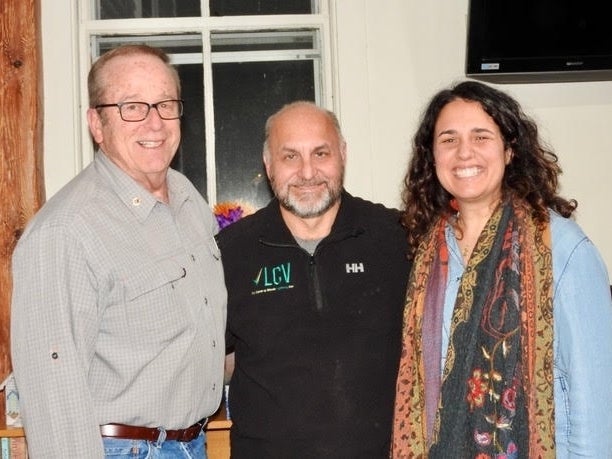
At a recent event hosted by the Democratic Committees of New London, Sutton and Wilmot, Bob Werner of the League of Conservation Voters addressed one of the top two issues for Democratic voters in New Hampshire for 2020: the urgent need for action on climate change. Health care is the number one issue and climate change the number two issue for Democratic voters in 2020, based on national polling and polling taken in the four early primary states of Iowa, New Hampshire, Nevada and South Carolina. LCV is a national advocacy organization focused on turning environmental values into national, state and local priorities.
Since 2014, Werner and a large full-time staff have led LCV's statewide efforts to educate voters about climate change and motivate them to support candidates and office holders who prioritize climate action at the state and federal level.
"If we don't have the right people sitting in these (leadership) seats, we can't make climate action happen," Werner said.
The LCV draws attention to the effects of climate change in New Hampshire, where residents are seeing major impacts on their lives and property.
"The impacts are both environmental and economic," Werner said, "and they are generating greater awareness and support for renewable energy and legislative action."
The impacts are most evident in the Seacoast Region, where flooding is threatening coastal communities and has rendered some residential properties unsalable.
"People don't realize what's baked in with 30 years of sea level rise," Werner explained. "Some coastal cities like Miami are not going to survive in their present form, and some of our coastal areas will no longer be livable. We will need to think about an organized retreat (in some areas)."
Climate change is also affecting the maple sugar industry in New Hampshire, where warmer temperatures have decreased the sugar content of sap. As a result, Werner said the industry must produce twice as much sap to achieve the same yield of maple syrup as it did in the past.
Warming temperatures in the state's forested lands have caused tick populations to explode, a phenomenon that has proven deadly for moose calves and dramatically reduced the region's moose population. It's devastating, Werner acknowledged, although he suggested the moose population would likely stabilize at some point.
Werner and his LCV colleagues also work with legislators and policy makers to develop programs and legislation to achieve specific environmental conservation goals. They provided research and support for bipartisan clean energy legislation that emerged this year but were disappointed when Gov. Chris Sununu's vetoed these bills. In total, the governor vetoed 57 legislative bills in 2019, a record high for a New Hampshire governor.
With the approach of the 2020 elections, Werner believes the New Hampshire electorate is at an inflection point with majorities of voters across the political spectrum expressing support for the goal of 100 percent clean energy for the state. As the costs of renewal energy go down and become competitive with those of fossil fuel sources, clean energy goals are attainable and sustainable.
Communities and institutions across the state are investing in large-scale solar arrays andmountain top wind turbines, and Werner also sees huge potential in offshore wind farms as a renewable energy source for the future. He is encouraged Sununu has agreed to fund a major study of offshore wind farms as potential sources of good jobs and clean energy for New Hampshire.In May, the LCV launched its Change the Climate 2020 program, calling on the Democratic presidential candidates to prioritize the climate crisis and good-paying clean energy jobs, as well as develop comprehensive climate plans to transition the nation to a 100-percent clean-energy economy.
All the major Democratic candidates are responding to the call to make climate change action one of their highest campaign priorities.Another sign of hope for Werner is New Hampshire's young people, who are among the most engaged constituents on climate change. He says they are educating themselves and others on climate science, building support and taking actions in their schools and communities. For its part, the LCV provides high school and college students with the tools and resources they need to become effective participants and leaders in climate action."It is young people who will be the most affected by climate change in the future," Werner said, "and we like to see them taking leadership roles."